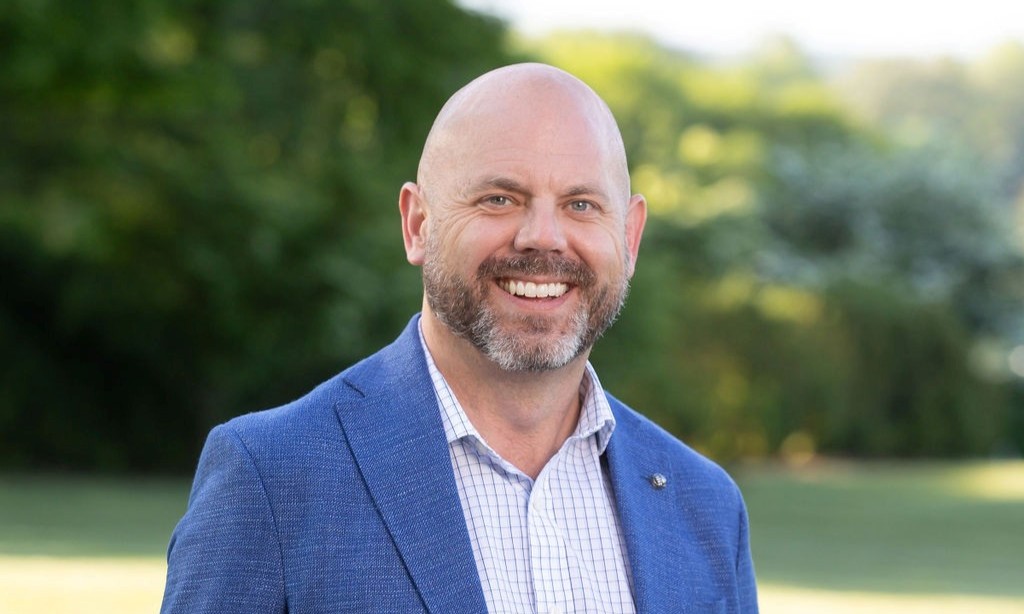What does a Wall Street banker know about farming? In David Chattleton’s case—absolutely nothing at first. And that turned out to be just fine.
His journey from Morgan Stanley to launching a multibillion-dollar agriculture investment firm started with a meeting he almost skipped and a willingness to say “yes” without knowing where it would lead. Looking back, Chattleton credits his McIntire education for giving him the confidence to leap into the unknown. “Even if I didn’t know something, I could find a way to figure it out,” he says. “That was bred into us during my undergrad experience.”
That mindset carried him from Charlottesville to Wall Street, and eventually to founding Tiverton, where he’s now managing over $2.25 billion in agriculture investments.
Learning to Swim in the Deep End
Chattleton was a Finance and Management concentrator who still remembers the professors who shaped his thinking—Martha Maznevski, Neil Snyder, Larry Pettit, Rich DeMong, and Ray Haas among them. The Comm School’s approach was immersive and a little intense. “They take you to the deep end of the pool at McIntire, drop you in, and see if you sink or swim,” he recalls.
That sink-or-swim mentality became his superpower. Early in his career at McKinsey and Morgan Stanley, he found himself working on deals in industries he knew nothing about—like medical devices for knee and hip implants. “I had no background in that space, but within months I was conversant in how the industry worked.”
The pattern repeated itself throughout his 11-year stint at Morgan Stanley: Encounter something unfamiliar, figure it out fast, and deliver results. “The technical chops McIntire builds allow you to fight above your weight class,” he says. “You feel comfortable taking on more responsibility and raising your hand for various assignments and projects.”
A Meeting That Changed Everything
Chattleton’s pivot to agriculture started with pure happenstance. “I knew nothing about agriculture,” admits the Long Island-born, Baltimore-raised finance professional. “My boss at the time said, ‘Hey, want to come to a fun meeting?’ and I said, ‘Sure, but I’ll just get everyone coffee.’”
That meeting opened his eyes to the $4.3 trillion agriculture economy—an industry that’s both everywhere and invisible at the same time. “The world of agriculture is both intimately known and wholly unknown by most Americans,” he explains. “It’s an activity you engage in three times a day, and yet it’s still almost entirely family owned and operated.”
The opportunity was too compelling to ignore. While still in their mid-30s, Chattleton and his wife, fellow McIntire ’00 alum Christy Johnsen Chattleton, made a bold move: They quit their jobs, sold their New York apartment, and relocated to Raleigh, NC. There, he launched an agriculture investment firm from scratch, naming it Tiverton after a Charlottesville mansion he used to drive past as a student.
Cold Calls and Crop Budgets
Starting an agriculture investment firm with zero connections in farming meant doing things the hard way. Chattleton began cold-calling farmers across the country with a straightforward pitch: Partner with his firm as an institutional capital provider and co-owner.
The first deal—with a distressed Idaho dairy—proved the concept worked. From there, Tiverton grew, offering credit solutions for larger operations and minority-control partnerships with multigenerational family businesses.
Today, the firm has nearly 40 employees, offices around the country, and manages over $2.25 billion. Clients include one of the largest U.S. growers, packagers, and processors of apples, cherries, and pears.
Chattleton’s workday toggles between boardrooms and orchards, spreadsheets and harvest schedules. About half his team comes directly from the farming world—a deliberate choice. “That world is a closed network. Everybody knows each other,” he says. Breaking in requires authenticity and patience. “You have to wear that hat and really walk that walk. You can’t just talk it.”
Over the years, he estimates he’s built about 10,000 working relationships across the country. He’s visited clients in Yakima, WA; Queen Creek, AZ; Salem, OR; and Sacramento, CA. He’s eaten steaks raised by the ranchers sitting across from him and attended his business partners’ kids’ soccer games.
“It’s the definition of a business that’s both literally town and country,” he says.
Advice for Aspiring Entrepreneurs
Chattleton doesn’t romanticize entrepreneurship. His first rule: Prove it before you pitch it. “The best people take a really good idea and find the smallest way to prove it out from end to end. Everyone’s got tons of great ideas, but can you actually bring it to fruition in some small way, shape, or form?”
The second rule: Develop a thick skin. “All good entrepreneurs are unbelievably good at getting punched in the face repeatedly. When everyone else stops, they get punched again.”
His own journey has required every skill he picked up at McIntire—accounting, management, finance, auditing—plus a willingness to keep saying “yes” to work he’d never done before and figuring it out as he went.
Despite building a successful firm from nothing, Chattleton still calls himself an “accidental entrepreneur”—someone whose path emerged from recognizing an opportunity, testing it, and pursuing it with persistence.
His advice to students with startup dreams? “Too many people give advice; it’s more fun to go through the experience than receive the advice. If you’ve got the itch, scratch it.”



